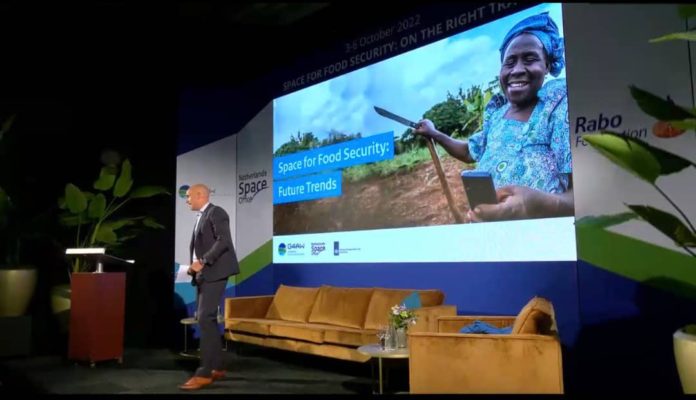Food systems transformation in Africa with digital technologies and innovations is becoming a must to do.
This was clearly stated on Monday in Utrecht, Netherlands, during the opening of the 6th international conference “Space for food security: on the right track” attended online.
The partners of the G4AW program (Geodata for agriculture and water), startups in the agricultural industry, developers of space applications, investors, and so on… are actively involved in the exchanges.
According to the hosts, this conferences goal is to measure the impact of geodata and technology solutions on improving small-scale farmers’ living conditions on which the Dutch G4AW program has been working on for the past eight (8) years.
Ruud Grim, program manager of the Netherlands Space Office (NSO) team, planner of the conference declared that: “it is wonderful to see the G4AW program impacting so much and how it has inspired so many others. We must not lose our momentum. We want to put all of our energy, our motivation and our knowledge into continuing our efforts to contribute to the increase of food and income security”.
He specified that this meeting is part of a framework of sharing experiences of various actors and discovering new technological trends that can meet in the best way small farmers’ current and future needs.
The panelists acknowledged that farmers indeed are extremely suffering from the effects of climate change, but technology and geodata are ultimate keys to achieving the goals of sustainable development. A solution that is relevant from their point of view.
However, they note that proposing only technological solutions for climate change resilience won’t solve the problem. They suggest in parallel to deal with poverty and focus on the basic principles of poverty reduction so the challenge will be complete.
The challenge is aiming for a significant scale. 50 million of farmers in Africa will be resilient to climate change by 2050. This will require better support for agricultural actors by all means, including making private finance easy to access.
Digital is the key
Bruce Campbell, principal advisor for food security and rural well-being at the Global Adaptation Center (GCA), emphasized that digital can help farmers make better choices.
He adds that; “it can help them scale climate services by connecting more than 200 million farmers and agro-industries to clustered advisory services enabled by information and communication technology based on greater connectivity and create public-private partnerships”.
In the African countries where the program is being implemented, notable improvements are already being noted. For example in Burkina, cowpea farmers are receiving climate advice.
More than half of these farmers are changing their practices, 6% are using improved seeds, and 66% have additional profit margins.
In Kenya, 98% have cell phones, 25% receive market alerts (purchasing and sales), and 18% receive alerts. In Tanzania, every dollar spent on a campaign for vegetable farmers leads to the adoption of new practices.
There is therefore an urgent need to transform food systems, create a policy environment, regulatory and institutional environment, cooperate with users of the solutions, and pay attention to business models and costs.








